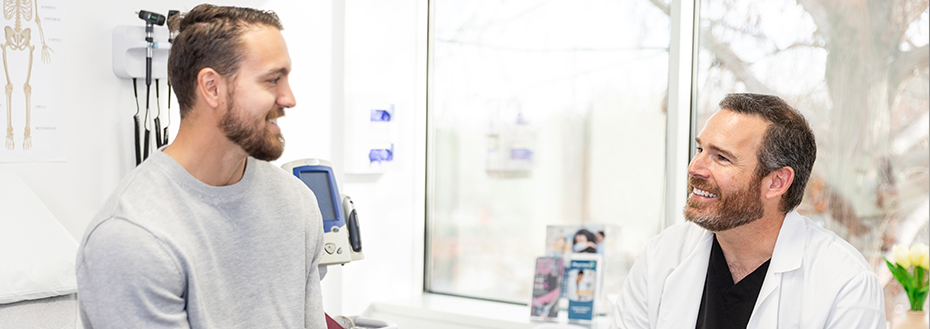Treatment for Adult Congenital Heart Disease

There are many types of congenital heart disease. The right treatment for you depends on:
- What heart problem you were born with
- If it is mild, severe or in between
- If doctors treated your problem when you were younger, and how they treated it
- If the problem has changed over time
- If your condition is causing symptoms
If you experience any problems related to adult congenital heart disease (ACHD), you may need to see an expert in ACHD who can help you with:
- Tests and special cardiac imaging
- Heart surgery
- Heart care during pregnancy
Routine care for ACHD
If you were born with a heart problem, it is important to pay attention to your heart health for your entire life.
Checkups: Every adult with congenital heart disease needs regular checkups. Even if your problem was treated when you were a child, you need to see a cardiologist (heart doctor). How often you need to see your doctor depends on your condition. Most patients will need to be seen every one or two years. Your doctor will check your heart health and look for any changes.
Medication: Medication can be an important part of your treatment. You might need medication to lower your blood pressure, help your heart work better, prevent blood clots or fix an irregular heartbeat.
Heart imaging: Depending on your condition, you may need regular imaging tests, such as an echocardiogram or a cardiac (heart) MRI. It’s important to work with doctors who understand adult congenital heart disease and know what to look for in these imaging tests. OHSU’s imaging specialists are experts in many kinds of heart conditions, including ACHD.
Treatments for adult congenital heart disease
People with congenital heart disease have a higher risk for heart failure or other severe forms of heart disease. You may also need more care to repair a problem that was not fixed when you were younger. In those cases, your doctor may recommend medicine or other treatments.
Other treatments for adults with congenital heart disease include:
Medical device: You might need a pacemaker to keep your heart beating at a normal rhythm. Or you might need a device called an implantable cardioverter defibrillator to quickly get your heart back to normal if it beats irregularly.
Nonsurgical procedure: During cardiac catheterization, doctors can insert valves or stents through a large blood vessel. This can help treat leaky valves or narrowed vessels. Doctors can also use X-rays and other cardiac imaging tools to see inside your body and fix heart problems.
Heart surgery: If medication, a device or a nonsurgical procedure does not work, your doctor might recommend heart surgery as the best option. OHSU’s heart surgeons are experts in even the most complex surgeries.
Making the move to adult care
If you were born with a heart defect, your parents or caregivers managed your heart care when you were young. Pediatric cardiologists (children’s heart doctors) took care of you.
In Oregon, you are not required to switch to adult care at a certain age. But you usually do this around 18 to 21 years old. OHSU can help you transition to adult care.
As an adult, you start to manage your own care. This includes:
- Knowing what type of heart condition you have, which treatments you’ve had and which medicines you take
- Understanding which symptoms mean you need care right away
- Knowing if you need antibiotics before seeing a dentist
- Learning how your heart affects your future health
Pregnancy care for people with congenital heart disease
Most people who have a congenital heart condition have safe, successful pregnancies. Still, we recommend you see an ACHD specialist:
- If you are considering getting pregnant
- If you are pregnant and have a congenital heart condition
- If your doctor refers you to us for heart-related symptoms while you’re pregnant
We like to see you at least once each trimester for routine testing, to make sure you and your baby are doing well. If needed, we can adjust your medication or see you more often.
We work closely with the Maternal Cardiac Program at the OHSU Center for Women’s Health, which has doctors who specialize in complex pregnancies.
Other OHSU services
OHSU offers many specialty services for adults with congenital heart disease, including:
- Care for people with inherited aortic diseases
- Post-surgery care for people who had arterial switch repair, Fontan repair, Mustard repair, Senning repair or the Rastelli procedure
- Treatment before, during and after heart failure and heart transplant
- Procedures to address heart rhythm issues
- Noninvasive cardiac (heart) imaging, including MRI and CT scans
- Exercise stress testing
- Cardiac catheterization and other interventional procedures
- Heart surgery
Participate in adult congenital heart disease research
Your doctor may ask if you would like to participate in a research study or clinical trial. We work with other top research hospitals around the world and study the latest treatments.
Your doctor can talk with you about any heart disease clinical trials that might be right for you.
Locations
Center for Health & Healing, Building 1
3303 S. Bond Avenue
Portland, Oregon 97239
Free parking for patients and visitors
Refer a patient
- Refer your patient to OHSU.
- Call 503-494-4567 to seek provider-to-provider advice.
ACHD clinical trials
Clinical trials allow patients to try a new test or treatment.